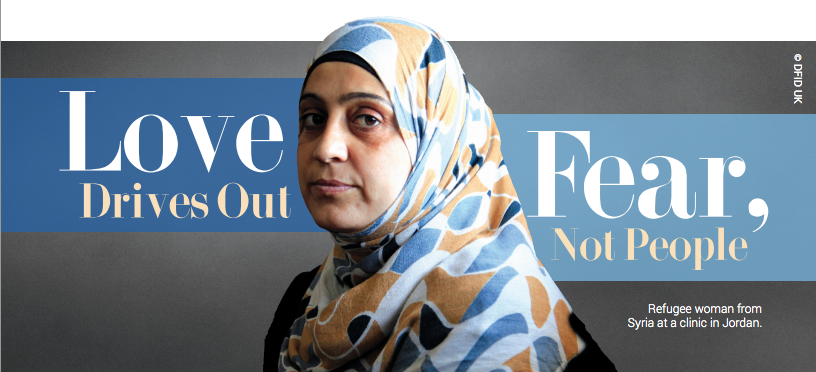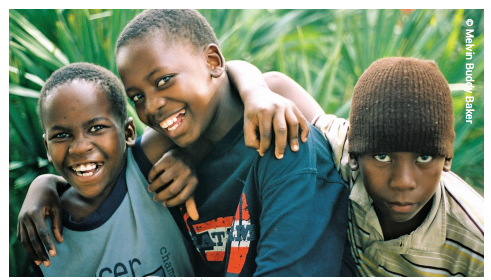Love Drives Out Fear, Not People

Refugee woman from Syria at a clinic in Jordan.
Syria, Afghanistan, and Somalia: three countries with majority Muslim populations were the top three countries of origin for refugees in 2014. Russia, Germany, and the United States: three countries with majority Christian populations were the largest recipients of requests for asylum. The refugee crisis crosses not only continental divides, but religious lines as well. While the international community must always aim to resolve the problems of violence and insecurity at the source of the refugee crisis, we must find ways to fulfill our humanitarian responsibilities, and foster a climate of peace, understanding, and appreciation among diverse peoples of all religious professions in our world.
Reading reports and editorials in both mass media and social media in the wake of the Paris attacks, one can feel the suspicion, fear, and hostility when encountering the stranger. There is the old saying, “familiarity breeds contempt,” but in this case, unfamiliarity breeds contempt. We fear what we do not know. For many people in countries receiving requests for asylum, religion quickly becomes a sticking point. Many believe that religion itself is part of the problem, not the solution, to the refugee crisis today. Linking Islam to violence can lead one to misunderstand the core tenants of that religion. Looking more closely at the commonalities of faith traditions can lead to a response to refugees that drives out fear and leads to deeper communion among all peoples.
In the scriptures of Islam, Christianity, and Judaism, three key themes pervade the narratives of God’s love for humanity and call for imitation of that love in our care and concern for others in situations of vulnerability and displacement. Focus on kinship as members of the human family can lead us to a recognition of our common roots and responsibility toward one another. In turn, this kinship can evoke compassion for the suffering of those who leave their homes out of fear and encourage us to open our doors and our hearts in courageous rejection of that fear. These three themes—kinship, compassion, and hospitality—can serve as common touchstones for a mutual understanding by those of diverse religious professions that religion is not the cause, but solution to a crisis that touches us all on a global and personal level.
The most personal bonds that tie human communities together are those of family and kinship. The saying, “charity begins at home,” encourages us to attend to the needs of those bound to us by blood and genealogy, but a closer examination of religion opens us to a broader understanding of home. The most recent encyclical of Pope Francis, Laudato Si’, subtitled “On Care for our Common Home,” invites “every person living on this planet” to think about the ways in which we share a common responsibility. Francis points out that we not only dwell in and rely on the same gifts of Earth, but he calls all people to deeper reflection on the ways in which we are family dwelling in a common home. In both Christianity and Judaism, we recognize a common ancestry in our first ancestors, Adam and Eve, and the covenant God made with them and all their descendants. Islam too recognizes and lauds this common root where the Quran states, “People, be mindful of your Lord, who created you from a single soul, and from it created its mate, and from the pair of them spread countless men and women far and wide; be mindful of God, in whose name you make requests of one another. Beware of severing the ties of kinship: God is always watching over you” (Quran, 4:1). It is not only the Bible that attests to the common bond and responsibility we have to one another, but Islam as well notes the accountability we have to one another and God to be as family.
If we recognize every other human person as a brother or sister in our common human family, it sensitizes us to the needs and sufferings of our kin. In the monotheistic religious traditions of the West, as well as Hinduism, Buddhism, and many other religions, compassion is the hallmark of devotion to divinity. In Islam, one of God’s key attributes, Rahman, or compassion, is invoked at the beginning of nearly every sura of the Quran: “In the name of God, the Compassionate, the Merciful.” Imitation of God is at the very heart of submission to the will of God as a Muslim. So too in Christianity and Judaism, where God is praised for compassion more than a dozen times in the Psalms and the label of “neighbor” given to the Good Samaritan “who showed compassion.” The religions of the world recognize that identifying and responding to the sufferings of others as one’s own suffering is the sign of true religion and doing justice to God and others.
Surely many of us in countries that can offer secure asylum to refugees are suffering ourselves and fearful for our own lives and security. However, it is not in keeping with righteousness to close our doors to those in need. Moreover, the great mothers and fathers of our respective faiths including Moses, the Holy Family, and Mohammed, all in their own lives sought asylum and the hospitality of strangers. The scriptures of our respective traditions call us to welcome the stranger. Not only does Islam have its own tradition of hijrah, or migration law, to care for and accommodate those seeking asylum, but Christianity and Judaism recall God’s concern for those on the margins—widows, orphans, and foreigners—with no standing before the law. Welcoming the stranger opens us up to the same vulnerability experienced by the one seeking hospitality. In opening our door to the stranger, and doing so in concert with those in our own and other religious communities, we can be vehicles of God’s compassion to all those bound to us in the ties of common human kinship.
For a third year, my wife and I celebrated the very American holiday of Thanksgiving with students and staff at Georgetown University who were unable to head home for the long weekend. A quick census of origin found we hailed from China, Ecuador, the US, Pakistan, Mexico and many other far off places. Two of our guests from France, acknowledging the recent tragic events in their home country, raised a glass to toast the gathering: “Isn’t it beautiful to have an open door!” This may very well indicate a way forward for us all as we continue to grapple with the fear, uncertainty, and disorientation that the refugee crisis presents to us today. Refugees are not only our guests, but our family, and our houses, their homes. May we always open our doors to those unable to go home—driving out fear, not people. As the First Letter of John reminds us, “There is no fear in love, but perfect love drives out fear …” (1 John 4:18).
This article was originally written for the Intercommunity Peace & Justice Center , published in the Winter 2016, and is available online here . Written by Marc Rugani , Chaplain-in-Residence for Georgetown University.
